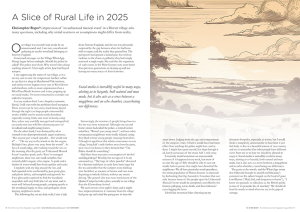Christopher Roper’s impression of ‘an unlicensed musical event’ in a Dorset village asks many questions, including why initial reactions or assumptions might differ from reality.

Our village was recently kept awake by an unannounced and, I am sure, unauthorised gathering in nearby woodland belonging to Forestry England.
Concerned messages on the Village WhatsApp Group began before midnight. Should the police be called? The police were there. Why weren’t they doing anything about it? A hot night in late June had frayed tempers.
I am suppressing the name of our village as it is not my aim to raise the temperature further; suffice to say that it is deep in Marshwood Vale territory, and similar events happen every year in West Dorset and elsewhere, with no more organisation than a WhatThreeWords location and a time, popping up on social media. I’m more concerned to consider our collective response.
Lest my readers think I am a hopeless romantic liberal, I will start with the problems that I recognise. These events can be very noisy; loud music played through the night can keep people unreasonably awake; wildlife can be unnecessarily disturbed, especially nesting birds; and, most seriously, camp fires, unless very carefully managed and extinguished, can easily turn into wild fires destroying acres of woodland and neighbouring homes.
On the other hand, I was dismayed by what seemed to me disproportionately angry responses, “Has anyone got a muck spreader…that would sort it!” … “On my way to the woods in the fire engine. Multiple Fires, please stay away from the woods”. As far as I could judge, after walking round the site on the morning after the party; an ‘Unlicensed Musical Event’ in police speak; and a ‘Rave’ to outraged neighbours, there was one small campfire, that certainly didn’t require a fire engine. A spade and a bucket of water would have been quicker and easier.
I regularly walk my dog around the site, and had expected to be confronted by post-party glass and plastic debris, and trampled undergrowth. So I was pleasantly surprised to find the woodland unspoiled, with very little litter of any kind, and to meet well-behaved young people, camping quietly in the woodland, happy to chat, and apologetic about keeping neighbours awake.
The following day, on my daily walk, I met a lady from Forestry England, and she too was pleasantly surprised by the gap between what she had been told to expect and the reality that greeted her. The partygoers had opened a locked gate, but without violence to the chain or padlocks; they had simply removed a single staple. She said that the organisers of such events in the West Country now seem better than previous generations at clearing up and not leaving too many traces of their festivities.
Interestingly, the reaction of people living closer to the site was more restrained. Although one second home owner had called the police, a retired farmer asked her, “Weren’t you young once?”, and two other octogenarian neighbours were totally relaxed, saying they liked to hear young people enjoying themselves. I thought it significant that relative newcomers to our village, living half a mile further away from the party, were most vociferous in their demand that “The Police should do something”.
Had there been excessive consumption of alcohol and illegal drugs? Possibly, but no sign of it to my untrained eye. “The bags of white powder” observed by a fireman could just as easily have been sugar for the tea and coffee that the campers were drinking over breakfast, as cocaine or heroin; and vans were departing in orderly fashion, without any erratic driving. The general vibe was more reminiscent of the Quaker Camp that takes place annually in our village than the Glastonbury festival.
We can’t restore a lost night’s sleep, and it might have improved matters if someone from the village had gone up and asked the partygoers to turn the amps down. Judging from the age and comportment of the campers I met, I think it would have had more effect than anything the police might have said or done. I might have gone myself, but slept through it all, barely conscious of the music half a mile away.
It certainly would constitute an unreasonable nuisance if it happened every week, but most of us over the age of fifty should be able to cast our minds back to parties that might have disturbed the neighbours. We all have particular social prejudices; the urban population of Britain became so incensed by foxhunting that they banned it. I mention that one only because many of the people upset by Unlicensed Musical Events would be completely unruffled by fox hunters galloping across fields, and their followers’ cars clogging the lanes.
I don’t like mountain bikes churning up my favourite footpaths, especially in winter, but I would think it completely unreasonable to ban them. I just feel lucky to live in a beautiful corner of our country, and try to remember that other people have different views from me as to how we should be allowed to enjoy it. Social media is incredibly useful in many ways, alerting us to hazards, both natural and man made, but it also acts as a cross between a megaphone and an echo chamber, exacerbating our differences.
The party in the woods, and the WhatsApp storm that followed, brought to mind Lord Macaulay’s comment on the odium heaped on the head of poor Lord Byron (“Mad, bad, and dangerous to know”), “I know no spectacle so ridiculous as the British public in one of its periodic fits of morality.” We should all bear his words in mind when we are in the grip of outrage.



